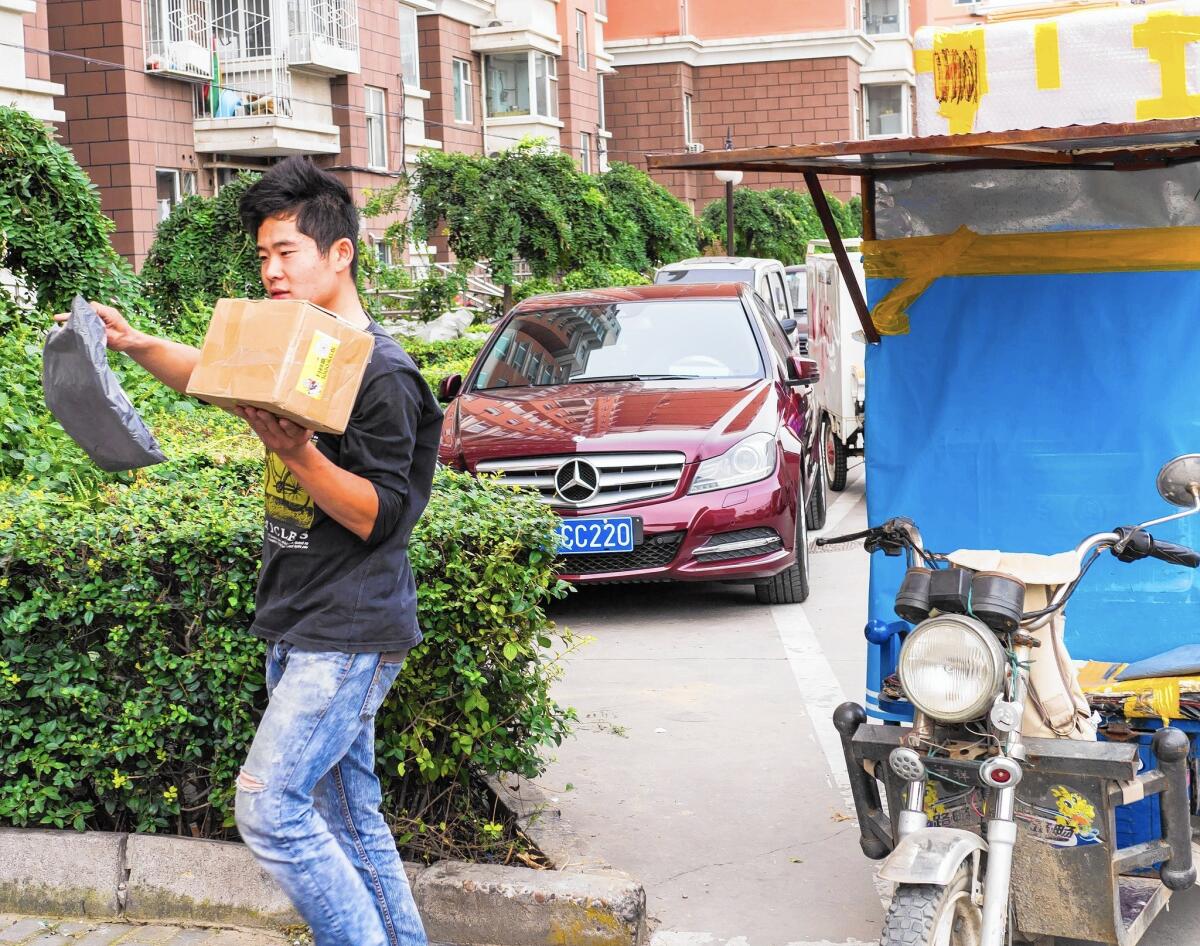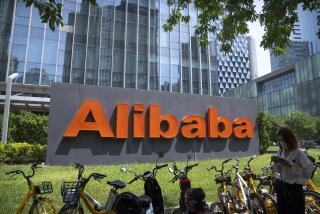Alibaba, set for U.S. IPO, delivering boost to China’s parcel services

- Share via
reporting from BEIJING — When shares of Chinese e-commerce giant Alibaba Group Holding begins trading Friday on the New York Stock Exchange, 23-year-old express delivery man Diao Binghui will be wrapping up his typical 131/2-hour workday half a world away in Beijing’s eastern suburbs.
Zigging and zagging on a three-wheeled electric cart, Diao navigates a two-mile route through vast apartment complexes. His mobile phone buzzes constantly, as his regular customers ring to find out when he’ll arrive with their book bags and T-shirts, cellphones and cameras, skirts and shoes, and other sundry items bought online — including, on one occasion, 100 pounds of dumbbells.
Some of Diao’s customers live six floors up — without an elevator. For each package he drops off, Diao pockets about 15 cents. For boxes he picks up, he makes 30 to 45 cents. He takes only 10 days off a year, and in a good month under a franchise agreement with ZTO Express, he can earn $1,500 — more than many recent college grads.
Diao and hundreds of thousands of Chinese couriers like him owe their jobs to Alibaba. A decade ago, when the company had just launched its now-massive Taobao online shopping marketplace, China had only about 10,000 people employed as express delivery couriers, said Xu Yong, chief advisor at Shanghai company China Express Logistics Consulting. Now, Xu said, the nation has more than a million. Alibaba founder Jack Ma has put the number higher — perhaps as many as 2 million.
But Alibaba is equally indebted to the likes of Diao. The company on Friday is expected to raise a record-setting haul topping $21.8 billion in a U.S. initial public stock offering. With shares priced at $68, the business would be valued at an eye-popping $168 billion. The business would never have grown to such proportions if not for the more than 8,000 courier firms that have sprung up in China in the last decade.
Even as Alibaba’s rivals including JD.com, Suning, Dang Dang and Amazon China built their own delivery networks, Alibaba relied on firms such as ZTO so it could service customers without investing massive sums in distribution. The hustling crush of workers such as Diao have kept competition cutthroat, making next-day or second-day delivery the norm, not the exception, in major cities. Customers often pay less than $1 per parcel.
“In many industries in China, the demand pushes supply to be put in place,” said Chen Weiru, professor of strategy at the China Europe International Business School in Shanghai. “It is a dynamic equilibrium.”
“It’s the delivery industry that has driven Alibaba and made it profitable,” said Xu, the logistics expert.
Alibaba launched in 1999 as a platform to connect Chinese manufacturers to wholesale customers abroad. Alibaba operates Taobao, an EBay-like site for Chinese consumers, that followed in 2003, and Tmall, which gives brands online stores to sell directly to shoppers, came online in 2008.
In the 12 months that ended in June 2014, Alibaba had 279 million active buyers who ordered $300 billion worth of goods on its platforms — more than Amazon and EBay combined. Those 14.5 billion orders were sent out in some 6 billion parcels.
China’s express companies delivered 9.2 billion items in 2013, up 60% from 2012, according to the State Post Bureau. That means Alibaba’s platforms generate perhaps two-thirds of all parcels.
When EBay and Amazon got started, the U.S. delivery services such as United Parcel Service and FedEx were already in place. But when Ma launched Alibaba, not only was China without delivery services — but it was also just getting started building highways. China had just 91 miles of national highway in 1989. By 2011, it had 53,000. (The U.S. national highway system, by comparison, totals about 220,000 miles.)
“Was he brilliant, far-sighted or gambling? I believe he was gambling a bit — or maybe people are just fearless when they’re ignorant,” said Xun Wu, assistant professor of strategy at the University of Michigan. “Alibaba started as a business-to-business company with foreign buyers and domestic suppliers, so at first the infrastructure needs weren’t as great.”
Improving infrastructure and intense competition have driven delivery costs down — the average fee for a parcel has dropped 50% in 2014 from 2006, said Chen, to about $2.30. But Chinese delivery firms still must invent special strategies to deal with the nation’s unique challenges.
In Shanghai, for instance, one delivery company employs “runners” who stay at subway stations all day, shuttling goods between couriers on trains to couriers just outside fare gates. In rural areas, many of which still lack paved roads, other methods are needed. One picture circulated last year showed delivery men shouldering a refrigerator up a dirt track with two sticks and a sling, coolie-style.
The demands and pressure can be intense. “I worry about losing the packages all the time,” said Zhang Lin, a skinny 21-year-old who works for Best Express in Beijing and is on his third pair of sneakers this year. “If I have to go to the fifth floor to deliver, the rest of my packages will sit on the tricycle. If I lose a valuable package, I have to pay from my own pocket.”
As Chinese consumers have grown accustomed to the luxury of cheap delivery, an anything-to-your-doorstep culture has become ubiquitous in major cities such as Beijing and Shanghai. For instance, couriers will bring you a McDonald’s hamburger or a bucket of KFC chicken for a $1 fee. Many local convenience shops will deliver anything, any time, if you spend more than $2 or $3.
Zhang says people now take him for granted. “Once I delivered a package in pouring rain. The package was wet, but I was soaked. The woman had a terrible attitude; she kept complaining while I was dripping,” he said. “But I was lucky she didn’t complain to my boss. Otherwise I would probably make nothing that day.”
The trend toward delivery shows no signs of stopping. This week, JD.com and Macquarie Capital said they would lead a $50-million round of investment in food-delivery service Daojia, which boasts a million registered users in China and 3,000 restaurants in its eight-city network.
The delivery industry has started to consolidate — the top five companies now have a total of 216,000 employees and serve 50% of the market.
“The use of technology and employee quality might be less than the mature companies like UPS and FedEx, but things are improving fast,” said Chen of the China Europe International Business School in Shanghai.
But perhaps not fast enough for Alibaba. Last year, soaring parcel volumes finally pushed the company to announce it would team with ZTO and four other major delivery companies and investors to create a $16-billion nationwide logistics network. When complete in five to eight years, the network aims to provide delivery anywhere in China in 24 hours.
Though a huge number of his 300-plus daily parcels are the result of transactions on Alibaba-run platforms, Diao says he hadn’t heard about the company’s IPO. “I don’t understand what it’s about,” he said.
Diao’s day starts at 7:30 a.m., when he picks up packages at the ZTO office and loads them into his three-wheeler, for which he paid $800 out of his own pocket. ZTO gives him his 15 cents for each parcel he delivers. For packages that he picks up from customers’ doors, he sets the rates and determines his profit margin. On average, he makes about $50 a day, working until about 9 p.m.
“I don’t really have time to start a hobby. I just watch some TV or use my tablet for entertainment when I’m free,” Diao said.
Zhang, likewise, says he has little free time, working seven days a week. He makes about $1,000 a month.
The busiest week of the year comes around Nov. 11, or Singles Day, which is China’s equivalent to Black Friday.
Last year, said Zhang, “I got really numb. I felt like I was a delivery machine — there was no time to chat with my roommates or call my parents, no time to eat or rest. There is only one thing to do: deliver packages.”
Because he lacks a college degree, he says, package delivery is the best he can do, although he does imagine other futures. “My dream is to work in an office — an office that is warm in the winter and cool in the summer; a job that I can have weekends and national holidays off and finish work around 6 p.m.,” he added. “I don’t know how I can get this kind of job, but it is my dream.”
Tommy Yang and Nicole Liu in The Times’ Beijing bureau contributed to this report.
More to Read
Inside the business of entertainment
The Wide Shot brings you news, analysis and insights on everything from streaming wars to production — and what it all means for the future.
You may occasionally receive promotional content from the Los Angeles Times.











